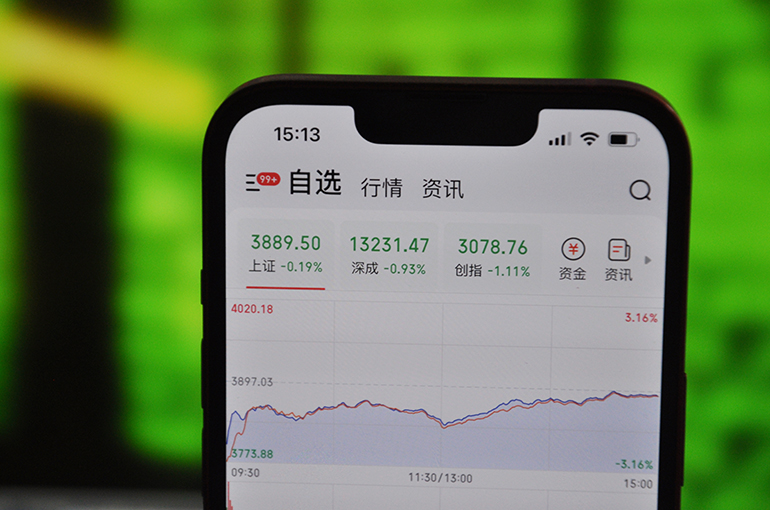 Chinese Stocks Fall on US Tariff Concerns; Analysts Expect Smaller Impact Than in April
Chinese Stocks Fall on US Tariff Concerns; Analysts Expect Smaller Impact Than in April(Yicai) Oct. 13 – Most of Chinese stocks extended their losses today as renewed tensions between China and the United States weighed on sentiment, following US President Donald Trump's threat to impose 100 percent tariffs on Chinese goods. But analysts said the market reaction this time may be less severe than the selloff seen in April.
Following the decline on Oct. 10, the Shanghai Composite Index [SHA: 000001] fell by 0.2 percent today, the Shenzhen Component Index [SHE: 399001] dropped by 0.9 percent, and the ChiNext [SHE: 399006] declined by 1.1 percent. However, the Star Market index [SHA: 000688] rose by 1.4 percent.
In comparison, on April 7, the Shanghai Composite Index plunged 7.3 percent, the Shenzhen Component Index tumbled 9.7 percent, the ChiNext sank 12.5 percent, and the Star Market closed down 16 percent.
Trump posted on Truth Social on Oct. 10 that China was “becoming very hostile” on trade and that he was considering a “massive increase of tariffs” on Chinese products. His comments triggered sharp declines across major US indexes, with the Dow Jones Industrial Average dropping 1.9 percent to close at 45,479.60, the S&P 500 sliding 2.7 percent to 6,552.51 — its biggest daily drop since April — and the Nasdaq Composite tumbling 820.20 points, or 3.6 percent, to 22,204.43.
Wu Zhou, a fund manager at Shenzhen Deyuan Investment, told Yicai that the decision on whether to impose additional tariffs will likely be made on Nov. 1. Wu said President Trump’s move was “probably aimed at increasing leverage before negotiations” and predicted that the market’s decline under the “Tariff 2.0” scenario would be smaller than the slump on April 7 during the “Tariff 1.0” phase.
Wu added that market downturns could offer a buying window for high-quality stocks with limited price gains, noting that both A-shares and Hong Kong-listed stocks may continue their adjustment cycles before entering a new upward phase.
Li Lifeng, a strategist at Huaxi Securities, said the latest tariff shock is expected to have a smaller impact than April’s selloff. In the short term, the escalation of China-US trade frictions will inevitably heighten market volatility, Li noted, adding that due to the “learning effect” of capital markets and improved mechanisms for stabilizing China’s market, the effect of this round is likely to be much milder.
Deng Lijun, a strategy analyst at Huajin Securities, said that in the long run, the slow bull trend of the A-share market remains intact. Corporate earnings are expected to continue improving structurally, supported by China’s domestic economy and policies, while credit conditions are recovering, and valuations are anticipated to remain relatively high. In the short term, the downside for A-shares is limited, and any adjustment within the slow bull trend presents opportunities for dip-buying and strategic positioning, Deng added.
A private equity professional from Guangzhou told Yicai that investors should be cautious about stocks with high margin financing balances and may consider “switching from high to low” by reallocating funds from overvalued to undervalued stocks. With third-quarter earnings reports being released, stocks with stronger-than-expected results could show sustained upward momentum, the expert added.
Editor: Emmi Laine